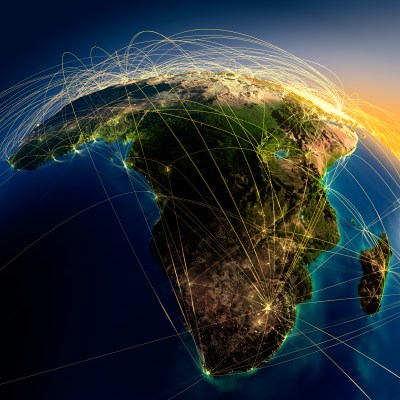Paying at a local coffee shop or superstore with your smartphone instead of your bank card is convenient, but not much more convenient than using a credit card. While there is significant disruption in some fintech areas, such as international money transfer by companies like TransferWise and Azimo, other innovations can seem a bit cosmetic to Western users.
One real opportunity is to fundamentally change how more than a billion people pay for goods and services across an entire continent.
The continent is Africa, the youngest on the planet by average age (just 18 years old). Africa is financially evolving fast without the burden of migrating from old technologies and infrastructure, such as a fixed-line Internet. Africans move directly to the latest smartphones to use a wholly mobile Internet and as a result, South Africa and Kenya are among the fastest-growing smartphone markets in the world.
Large migrating populations from rural to urban areas and to neighbouring countries are mainly young people, generating the majority of new wealth and sending much of it back home to relatives. It is still a complicated, time-consuming and inconvenient process for millions of people daily.
However, the lack of legacy means Africa is a greenfield opportunity for fintech. Entrenched issues continue to prevent the spread of traditional banking, quite in contrast to Western markets where fintech products and services compete with established trillion-dollar enterprises that benefit from consumer and merchant saturation and established digital payment habits. Eighty percent of Africans don’t have a bank account – let alone a credit card – but they have a phone, and for most that will soon be a smartphone.
When faced with a choice of cash, or nothing, digital access to your money presents an immediate benefit to consumers who otherwise ferry cashwages between home and banks on public transport over large distances. It is inefficient, costly and a security hazard. More problems arise with identity and reputation management, debt enforcement, credit scoring, access to financial products like insurance and even savings.
This means an alternative “banking” channel is being established by mobile wallets. Unlike Western wallets (typically run by financial institutions), African wallets are being built by mobile carriers that are investing to make them hugely popular: 183 million people in Africa already own a mobile wallet. That’s 3x the users of e-wallets in the U.S. and expanding at 3x the annual growth rate of the U.S.
If that trend continues, every African will have a mobile wallet by 2021.
However, mobile wallets are fragmented throughout Africa. This fragmentation presents a significant opportunity for fintech companies – to unify the structure of a fragmented e-commerce backbone. Carriers have built strong local footholds, but cross-border payments capability is almost non-existent. Networking these wallets will benefit all participants, add value to carrier infrastructure, increase sales for merchants and bring choice and utility to consumers.
Some of the issues solved by connecting local mobile wallets into a global network are:
- Cross-border money transfer: Europe alone is home to more than 10 million African emigrants who have relatives living back at home; while payment services can be used to transfer money internationally, the collection process remains archaic to the digital age – it requires a bank account or visit to a transfer location.
- Direct donations to people in need: Cutting out middlemen from aid programs increases transparency while ensuring help arrives to those requiring it in a much faster manner than in the past.
- Online payments for mobile commerce: Connecting local wallets to global merchants like Amazon or eBay would enable online purchases for at least 100 million users who have a mobile phone but do not have a bank account.
- Salary payments for international companies: Vodafone has already facilitated salary payments via mobile wallets; for international workers working in remote areas receiving their salary from Western countries, paying directly into mobile wallets would remove the need for expensive and time-consuming wire transfers.
Most fintech companies do not focus on Africa, perceiving a lack of existing infrastructure to build a viable business case. But carriers already have the infrastructure up and running and are alive to extend those assets with shared upsides, reduced acquisition costs and improved user retention. They welcome the experience of fintech companies to help accelerate user adoption and bring connections to new merchants.
Africa has both the need and the desire for better financial technology solutions. The rapid adoption of mobile wallets is just one. Cash offers access without full utility in respect of logistics and the lack of online payment capability.
Fintech companies that focus on Africa will find a certain complexity but with virtually no competition. Solving Africa’s cash problem is an opportunity to help over a billion people leapfrog to the next wave of growth.
